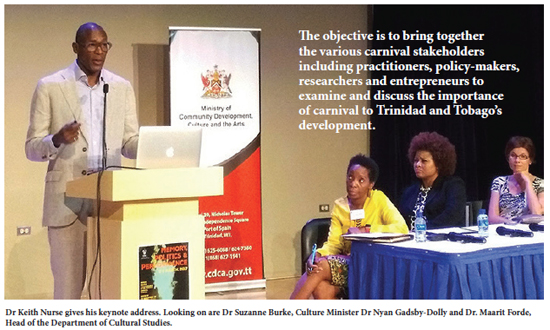

 It has been well over 175 years since the newly freed slaves of Trinidad took to the streets and began the transformation of a French Catholic feast into what has become the island’s most powerful form of cultural expression. Carnival has grown and changed shape and spread throughout the region and beyond. And in line with its importance is its impact. What has Carnival meant to the society? What does it have the potential to become? It has been well over 175 years since the newly freed slaves of Trinidad took to the streets and began the transformation of a French Catholic feast into what has become the island’s most powerful form of cultural expression. Carnival has grown and changed shape and spread throughout the region and beyond. And in line with its importance is its impact. What has Carnival meant to the society? What does it have the potential to become?
Policymakers, entrepreneurs, economists, historians, gender theorists, artists and educators discussed these questions and others at a Carnival Symposium organised by the Cultural Studies Section of The UWI St. Augustine’s Department of Literary, Cultural and Communications Studies. Titled “Memory, Politics and Performance in the Trinidad Carnival Complex,” the symposium was held on March 2 and 3 at the Government Campus Plaza Auditorium in Port of Spain and the Daaga Auditorium of the St. Augustine Campus. The symposium was held in collaboration with the Ministry of Community Development, Culture and the Arts.
Dr. Suzanne Burke, one of the organisers said the symposium’s objective was “to bring together the various Carnival stakeholders…. to examine and discuss the importance of Trinidad and Tobago’s development.”
The symposium, she said, “served as a vehicle to enhance the voice of Trinidad and Tobago’s academic community in global discourse on the Trinidad Carnival.”
The symposium opened with a keynote lecture by Dr. Keith Nurse, Senior Fellow at the Sir Arthur Lewis Institute of Economic Studies at UWI and one of the region’s foremost scholars on cultural industries. Participants discussed topics such as the Canboulay Riots, the steelband movement, gender and sexuality, and calypso.
One of the highlights of the event was an address by Minister of Community Development, Culture and the Arts Dr Nyan Gadsby-Dolly. The Minister spoke on the need for greater integration among the various special interest groups involved in the production of Carnival to improve the festival “in a holistic way.”
|





